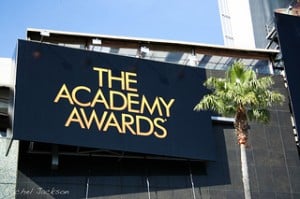Flight–a film whose mediocrity garnered but two Oscar nominations–begins with a bleary-eyed and sex-addled Denzel Washington snorting hotel-room cocaine to fight off a hangover. Did I mention he’s on the way to work? Where he’ll fly an airplane? That he’ll miraculously save from spiraling out of the sky? Also, that he scored a best-actor nomination?
Washington’s is among the most conventional of this year’s nominees. It’s easy to remember that Hollywood loves the anti-hero. One need only think of Jeff Bridges’s flamed-out country musician in Crazy Heart or Daniel Day-Lewis’s heartless oil magnate in There Will Be Blood. But along with the anti-hero, Hollywood loves its left-leaning politics. And those politics seem this year tough to find. Take the Best Picture nominees (which I’ll spoil below):
Les Miz sees the student-revolutionaries (seeking justice for the oppressed) crushed, reminding us the viewers that hope (sometimes) lies only in the afterlife. And while Zero Dark Thirty gives us the most realistic depictions of the CIA’s ‘enhanced’ interrogation methods (read: torture), it also views them with some sympathy, perhaps indispensable in the hunt for Bin Laden. Brutality in the name of self-preservation also gets a pass in Life of Pi. Its happy ending is a lie–Pi chooses to believe his fantasy about animals rather than face up to the brutal truth of the killing he had to do to survive.
The CIA–Hollywood’s go-to big brother of a villain–finds itself bathed in glowing light in the two best films of the year. The Agency’s startlingly competent in Zero Dark Thirty and downright cuddly in Argo. After savoring those films, it’s hard not to want to go and join the Company (Langley’s, not Rome’s).
Go back seven score and ten years and you’ll see a radical abolitionist–the phenomenal Tommy Lee Jones, whose best-supporting-actor statuette for his role in Lincoln seems certain–compromise his deeply-held belief in the dignity of African-Americans to nurse the 13th Amendment through Congress. And let’s not even talk about the way Django Unchained deals with race (indeed, enough others already have).
So what gives? Why no movies like Forrest Gump or Slumdog Millionaire or even The King’s Speech? Where has the idealism gone?
Better question: Why all the realism? Because the messy ambiguity of the world has overrun Hollywood’s left-leaning idealism. It’s not just the characters who have grown to mirror the moral mixed-bag of our own lives. No. Now films’ plots also mirror the gloomy reality of the world in which we live. Amour crystallizes the turn from dreams to reality with its touching dramatization of the slow, horrifying and inevitable diminishment of aging. Even the year’s best romantic comedy–the superb Silver Linings Playbook–sees successfully managing mental illness as a prerequisite for falling in love.
Has Hollywood given up hope? I’m not so sure. Maybe it’s just that hope’s not where we expect to find it. This year’s most gleeful hope and joy is in the depressed and dying swamp of Beasts of the Southern Wild. And there you find a more powerful kind of hope. A hope where mental illness need not prove a barrier to bliss. A hope where the CIA can be a force for good. A hope where even a selfish, stoned captain can save an airplane from destruction.
h/t Aaron Fullerton who tried (unsuccessfully) to watch all of the AFI’s top 100 movies and tried (successfully, I hope) to explain to me what some of these movies were about.


